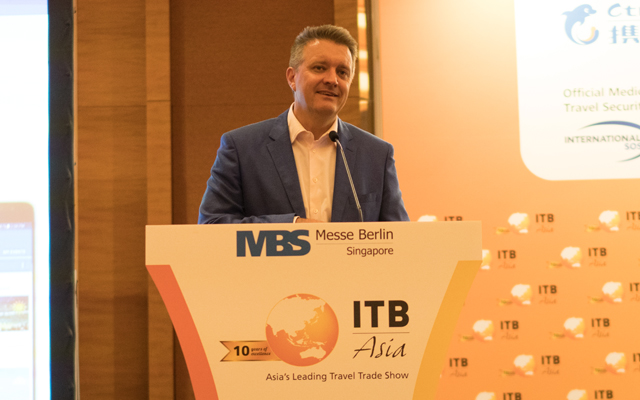Artificial intelligence (AI) took centre stage at yesterday’s ITB Asia 2017 Opening Keynote presentation, with industry leaders urging smaller travel and tourism players to embrace the technology in their business strategies, a move which can put them on a level playing field with the big firms.
Carl Livadas, Sojern’s vice president for data science, told TTG Asia that predictive data is a “normaliser” that can give smaller companies, such as boutique hotels, an edge over big chain competitors.
For example, AI can help a company determine and push out the most relevant products for existing and potential customers based on their location, trip-planning patterns and purchase histories.

When optimised, according to Livadas, such targeted marketing can be “non-intrusive”, enhance the user experience and contribute to customer service. Marketers can even make use of real-time AI to reach out to travellers mid-trip and suggest new products on the go.
These “real-time” recommendations can, for example, be introduced through interactive chatbots, chimed in Zumata’s CEO/co-founder, Josh Ziegler.
“The older way of looking at things was (through a) purely data-driven (perspective). That’s not the case now – every trip you take is different,” said Ziegler. “Real-time, on-demand personalisation is where this is going.”
With chatbots now in trend, IBM has launched a cognitive system, Watson, which serves as a personal assistant for companies to interact with their customers. The system not only collects and analyses data, but also learns from user behaviour to create a relevant experience.
Companies that have adopted Watson include Japan Airlines for its virtual assistant Manaka-chan and Pebble Beach Resorts for a California driving guide.
The use of data to enable such “hyper-personalisation” of travel experiences gives providers the “opportunity to expand into new markets”, said Mitchell Young, general manager – ASEAN, IBM.
At the Opening Keynote, Young shared that it is possible for AI to learn from data and even develop “emotional intelligence” and “infuse the mood of the customer… to create authentic interactions”.
However, industry shapers have acknowledged that AI may be intimidating to smaller players, who often perceive the movement as opaque and even threatening.
“The term ‘artificial intelligence’ has a lot of negative connotations of it being ‘man versus machine’,” observed Young. “(It’s actually) about how systems can amplify human capabilities.”
He asserted that, considering this, the industry is responsible for “continuing to reskill and train people to take advantage of AI and data science”.
Rob Torres, managing director, Google Travel, agreed: “Everything cannot go completely robotic. (The human touch) is not ever going to go away.”
He advised those with limited funding and resources to utilise open-source products – such as Google’s general machine-learning software TensorFlow – in order to learn, test and evolve.
- reporting from ITB Asia 2017




















